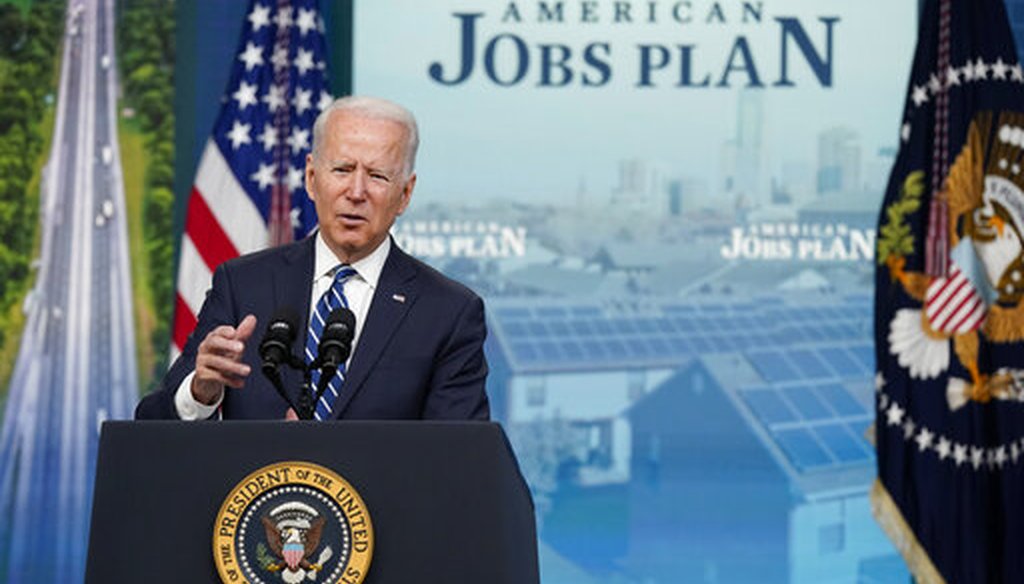Get PolitiFact in your inbox.

President Joe Biden speaks about the June jobs report in the South Court Auditorium on the White House campus on July 2, 2021. (AP)
Joe Biden’s boast on early job gains neglects timing, pandemic context
If Your Time is short
• Biden is right on the numbers and on how they compare with those of his recent predecessors.
• However, he glosses over the reality that the U.S. economy remains almost 6.8 million jobs under its pre-pandemic peak.
• In addition, these sorts of comparisons are highly sensitive to the economic conditions around the time of a president’s inauguration. Biden entered office during a deep recession, but he took over on the upswing, a situation that not all presidents have benefited from.
When the Bureau of Labor Statistics announced that the United States had gained 850,000 jobs in June, President Joe Biden took to a podium in the White House complex to tout the achievement.
"Good morning, everyone — it is a good morning!" Biden said July 2. "As we get prepared to celebrate Independence Day, today’s job news brought us something else to celebrate: This morning we learned that, in June, our economy created 850,000 jobs."
Biden went on to say, "We have now created over 3 million jobs since I took office, more jobs than have ever been created in the first five months of any presidency in modern history, thanks to the incredible work of the entire team."
Presidents’ claims about job creation on their watch can be troublesome. So how did Biden do?
What the numbers show
Biden was right on the numbers, we found, but he glossed over some important context.
The official government data shows that between January 2021, when Biden took office, and June, the number of employed Americans rose from 142.7 million to 145.8 million, or a gain of just over 3 million.
In numerical terms, that’s a bigger gain in jobs than for the equivalent period under every post-World War II president who first came to office in an election. (This comparison leaves out Harry Truman, Lyndon Johnson and Gerald Ford, each of whom initially assumed the office without being elected.)
The closest competitor to Biden was Jimmy Carter, with a gain of 1.8 million jobs.
Several caveats
Biden’s claim leaves out at least four important bits of context.
Raw numbers vs. percentages. By choosing to highlight jobs gained as his metric, Biden has an advantage in a comparison with previous presidents. The U.S. population has grown, and so has the labor force.
A fairer metric for comparison is the number of jobs gained divided by the starting level of jobs when the president took office. By this metric, Biden scores well, but he’s not No. 1. That distinction goes to Carter, who oversaw job gains of 2.2%, compared with Biden’s 2.1%.
Comparison to the pre-pandemic level. The U.S. economy is still almost 6.8 million jobs below the pre-pandemic peak — 145.8 million jobs in June 2021, compared with 152.5 million jobs in February 2020.
Put another way, if the gains from June can be replicated each month, it would take until February 2022 for all pre-pandemic jobs to be recovered (setting aside subsequent increases in population).
Given the severity of the pandemic recession, that would be a significant bounceback — but it hasn’t happened yet.
The question of timing. Biden entered office during a recession (and a global pandemic), but while the economy was on the upswing.
Most other presidents — aside from Barack Obama, who took office during a spiraling economic downturn — have entered the White House amid a growing economy. But the precise timing of their inauguration can play a big role in how a president’s first few months go, so Biden’s comparison to his predecessors is not really apples-to-apples.
Who gets the credit? Experts always caution that a president is not all-powerful in economic matters, since many factors beyond their control, from international oil supplies to changes in technology and demographics, can shape the health of the U.S. economy.
That said, experts say that Biden does deserve some credit for the job gains on his watch, given the gains in coronavirus vaccinations and the passage of his $1.9 trillion American Rescue Plan, which provided coronavirus aid and economic relief.
The White House did not respond to an inquiry for this article.
Our ruling
Biden said, "We have now created over 3 million jobs since I took office, more jobs than have ever been created in the first five months of any presidency in modern history."
Biden is right on the numbers and on how they compare with his recent predecessors in the Oval Office.
However, this talking point glosses over the reality that the U.S. economy remains almost 6.8 million jobs under its pre-pandemic peak. Meanwhile, comparing presidents as Biden did is highly sensitive to the economic conditions around the time of their inauguration; Biden entered office during a deep recession, but he took over on the upswing, a situation that not all presidents have benefited from.
We rate the statement Half True.
Our Sources
White House, "Remarks by President Biden on the June Jobs Report," July 2, 2021
Federal Reserve Bank of St. Louis, All employees, nonfarm, accessed July 9, 2021
Bureau of Labor Statistics, Employment Situation, June 2021
Email interview with Tara Sinclair, George Washington University economist, July 9, 2021
Email interview with Dean Baker, co-founder of the Center for Economic and Policy Research, July 9, 2021
Browse the Truth-O-Meter
More by Louis Jacobson
Joe Biden’s boast on early job gains neglects timing, pandemic context
Support independent fact-checking.
Become a member!
In a world of wild talk and fake news, help us stand up for the facts.




































